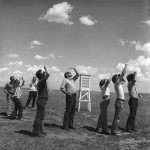 The concept of social proof is fairly well established, with the theory first proposed in a number of high profile experiments back in the 1950s and 60s.
The concept of social proof is fairly well established, with the theory first proposed in a number of high profile experiments back in the 1950s and 60s.
For instance, in the 1950s, Solomon Asch found that people are quite willing to deny evidence of their own senses so as to copy what other people are doing.
This was built upon by the famous street corner experiment conducted by Stanley Milgram whereby a growing cohort of people were asked to stand on a street corner gazing up at the sky for a minute.
When just one person did it, they were largely ignored, but as more people were added to the group, they managed to pull in more and more passers by, until 15 people were placed on the corner, at which point they attracted roughly 50 percent of all passers by to gaze skywards.
These showed the willingness of people to conform to the group norm, and so the term social proof was coined.
The concept is interesting because there isn’t any pressure on people to conform. The sky gazers aren’t cajoling the passers by, or even trying to persuade them to join them. Yet people do so because they assume that this many people must be looking upwards because of something amazing is up there.
It underlines the importance of the crowd, with that importance growing as the crowd gets larger.
Why people conform
A recent study set out to explore what it was that prompted people to conform to the group.
“Social psychology has always explained conformity from social perspectives: group pressure, desire to belong to the group, belief in the group’s superior knowledge, etc. The aim of the present study was to test whether even simpler mechanisms may account for at least some conformity effects,” the authors say.
The study revealed that our desire to copy what others are doing is not all about social pressure. Indeed, social pressure may not even be the main reason.
Instead, they suggest that our decisions are largely a case of forming a kind of ‘mental average’ of both our own past actions together with those of others.
In other words, we figure out how to behave in a situation by remembering how other people behaved in a similar situation, with our brain then confusingly recalling those behaviours as our own.
So we’re copying others, but thinking we’re acting independently.
Ha, fascinating. The brain is a weird and wonderful thing 🙂
Safety in numbers I guess is the main reason why people do it, but certainly fascinating research.
"So we’re copying others, but thinking we’re acting independently." — there goes all my original thinking and being different gone through the chute. 🙂 . Thank you. This is something to definitely think about.
Why do people feel the need to conform? Speaking for myself, it's fear. Fear that if I reveal my true self, I'll look like a fool. Heck, I might look like a fool anyway, so why not take the chance and be myself? All the other jobs are taken. But you're right about copying others. When we conform, we might be perceived as copying others in order to fit in.
We're all born as originals, but most of us disappear as copies..
I am also pretty interested in the conformity experiments of Asch. I came upon them in a book you might find intriguing; "Iconoclast" by Gregory Berns – a neurscientist. Your conclusion is also supported by how we learn language. It is sheer mimicry that enables us to learn the single most complex thing we will ever learn. Even though we think we are making up what we say as we go along, there is bound to be a lot of chunking and using of phrases we've used before. And if we think we don't repeat ourselves, we can just ask those that listen to us the most.
Thanks for the recommendation Deb, I'll be sure to check that out.
The experiment seems to speculate that it shows conformity, but is it. I think it is more likely showing our innate nature to be curious. Are people stopping and looking to conform, or that attention of others has reached critical mass such that it makes us want to look. The threshold is different for each person. Which would explain why my people looked as number of onlookers increased. It would be interesting to know level of innovation thinking had at each threshold. Are most innovative people the ones who look first?